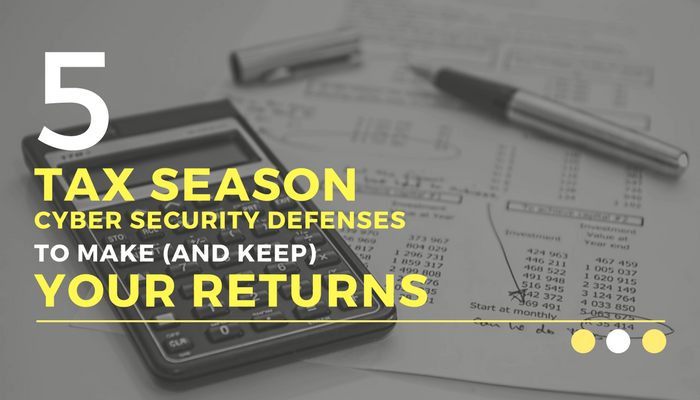Tax Season: Cyber Security Defenses to Make (and Keep) Your Returns

It’s that time of year again – the time of the year where winter coats are abandoned, flowers are in full bloom… and everyone starts to rack their brains for how to deal with their taxes from the last fiscal year. Tax season is a stressful time for most and, whether you hire an accountant or decide to tackle the numbers yourself, it’s no time for haphazard calculations. Every single cent counts in order to get the best return possible. But could your hard work go down the drain with a single click? According to a report from the Federal Trade Commission, of the half a million complaints registered in 2015, nearly half were tax fraud-related, and these frauds are increasingly conducted online.
Cybersecurity and tax fraud are two ideas that people don’t usually look at side-by-side. After all, the IRS will never send out an email to contact you (if they do, it’s probably a scam), but with the rise of the digital age, many accounting firms have seen the benefits of having taxpayers fill out necessary forms online, facilitating the process for both the taxpayer and the agency. However, digitizing the process has opened up a Pandora’s Box in the realm of cybersecurity.
Now, by no means does this mean that taxpayers absolutely need to revert to the pen-and-paper method of tax filing. Electronic forms are an enormous load off everyone’s burden during tax season, but here are some tips to keep in mind as you file your taxes so that at the end, you do make returns – and keep them. Here are our top five tips for making your tax season a little more secure:
Get it out of the way
Did you know that employers are by law required to provide W-2 forms to their employees by the end of January? Some may give their forms out earlier, and the IRS officially began accepting 2016 tax returns on January 23, 2017.
While it may be tempting to push it off until April, there are benefits to being an early bird. Not only do you get to be stress-free for Spring, but filling early means you 1) give the IRS time to immediately process and check your return, 2) avoid the peak period when hackers fish for victims in March and April. The latter part of tax season is when potential victims tend to be a little more scatterbrained, not utilizing as much discernment as they should in their securing their tax returns. Hackers are less likely to be looking for prey in January or February.
Watch out for phishing scams and links
As mentioned before, the IRS will never, under any circumstances contact you via emails, texts, or phone to demand money. They will always send a postmarked notice to “kindly” remind you to pay your dues. However, because this is a rather unknown fact, many fall prey to the phishing and pharming scams that hackers love to execute.
Especially in emails or text messages, be careful not to click on any links or attachments. Although it may be tempting to see what the IRS could want, these seemingly harmless links could trigger malware, and viruses could get installed on your devices to infect entire systems. The IRS encourages users to forward any emails you suspect of being fraudulent to phishing@irs.gov and delete it permanently from your inbox.
Keep your devices and connections clean
Updates are cumbersome and might take more time than you are willing to put in. However, an update could be the difference between a vulnerability and a strong defense against a loophole. Software, browsers, and applications should have the latest updates and any unnecessary software is best deleted to avoid cluttering your system.
Additionally, when filing your taxes, make sure to use a secure wireless connection. Public Wi-Fi is not your safest bet (read about our research on public Wi-Fi networks here), and hackers may be able to take a clear look at your sensitive data if they intercept your wireless connection.
Use Encryption
When sharing information with your accountant, make sure that your information is well-encrypted to ensure that a hacker will not be able to see the contents even if they do succeed in interception. Along those lines, double-check to make sure your online tax-filing agency is using SSL, which applies encryption to sites. Look for “HTTPS” in the URL, with a lock icon signifying a secure SSL connection. While an agency may claim to be “easy filing,” you don’t want that to mean “easy access” to your financial information.
Be careful of your… social media???
While social media may seem to be the furthest platform from your tax returns, many hackers have been utilizing a social engineering method called “social sleuthing,” where they will stalk a high-level executive to see if and when they go away on holiday or travel during these chillier months. Then, impersonating the executive, they may reach out to a lower-level employee back at the office, asking for help with paying taxes, or for sensitive information that they conveniently “forgot.”
Although hackers work year-around to try accessing our data, tax season is ripe for harvest when it comes to getting sensitive information, making it much more lucrative for hackers. The sad reality is that though the IRS may do their best to put preventative measures in place in terms of your W-2 or through public service announcements warning of fraud, the consequences that you may potentially encounter are solely your responsibility. At the end of the day, taxes are owed to the IRS, regardless of the situation.
But remember, many prevention tips are simple to implement – it just takes a bit of awareness and effort. Remember, no one enjoys tax season (except hackers), especially if there are any heavy consequences that may await in case of any loss, damage of data, fraud or scam.
